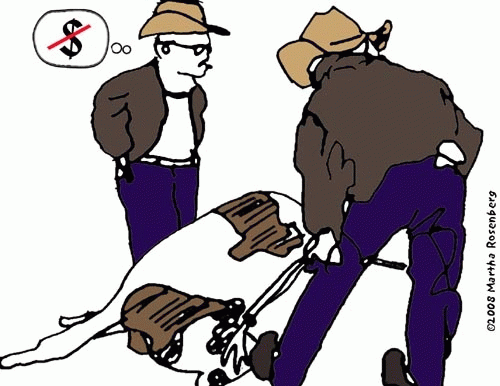The USDA is cutting back on federal meat inspectors, allowing slaughterhouses to self-police, and already questions about the program are surfacing. In February, USDA recalled 8.7 million pounds of beef products processed at Rancho Feeding Corp. that included Nestle's Philly Steak and Cheese and Croissant Crust Philly Steak and Cheese Hot Pockets, Walmart Fatburgers, Kroger Ground Beef Mini Sliders and other well known brands. The reason for the gigantic recall, says the USDA, is the slaughterhouse "processed diseased and unsound animals and carried out these activities without the benefit or full benefit of federal inspection." The multi-state recall, applying to all meat produced over a year at the facility, caused Rancho Feeding Corp. to close .
The USDA cost-cutting, self-regulation program, called HIMP (Hazard Analysis and Critical Control Point-Based Inspection Models Project) will eliminate 800 federal meat inspectors and is already in operation at about 25 chicken and turkey plants. It likely played a role in the Rancho Feeding Corp. recall said Stan Painter, president of the National Joint Council of Food Inspection Locals which represents 6,000 inspectors nationwide because "In many places, managers and veterinarians are being asked to help with inspections," because of a shortage of federal inspectors, he said.
Six years ago, Painter also spoke out about cutbacks in federal inspection when undercover video of "downer" cows moved with electric prods, forklifts and water hoses at the Chino, Ca-based Westland/Hallmark Meat Co. slaughterhouse surfaced. Painter warned that the government's cost-driven move toward self-regulation of private slaughterhouses amounted to the fox "guarding its own henhouse." The meat from the cows, which was supplying the National School Lunch Program, was recalled because of the high likelihood of "downer cows" carry Mad Cow disease. It became the largest meat recall in US history.
Westland/Hallmark had been cited by the USDA in 2005 for "too much electric prodding causing animals to get more excited while being driven towards [the kill] box," suggesting it was receiving sick and weak cows. But despite the USDA's "7,800 pairs of eyes scrutinizing 6,200 slaughterhouses and food processors across the nation" in the end, it took an undercover operation by an animal rights group to reveal" the abuse said the Los Angeles Times in a scathing 2008 editorial. Even before the recent meat inspector cutbacks, the government was allowing sick and diseased cattle to be processed for the US dinner table until the Humane Society of the United States intervened. Westland/Hallmark ceased operations soon after.
One ailment in cows that could slip through as the number of federal meat inspectors declines is eye cancer, says Bill Niman, a rancher who did business for 40 years with Rancho Feeding Corp. "A farmer sends a cow in with cancer, and he knows it has cancer-eye -- it's a growth on the eye, this is not a microbial situation," he told the Village Voice . "The inspectors, they know it has cancer-eye. So the farmer shouldn't have sent it, and the inspector should have caught it."
Both the shuttered Rancho Feeding Corp. and Westland/Hallmark were slaughterhouses where farmers could send and often dump their dairy cows who could no longer walk. "The cattle are going to go down in the truck," Rod Bolcao, owner of Chino Livestock Market told the Inland Valley Daily Bulletin who was familiar with Westland/Hallmark. They "aren't going to be strong enough to make the ride" and Westland/Hallmark was there "to pick them up," he said. Without a slaughterhouse like Westland/Hallmark for cull cattle, dairymen lose the $400 they would make on the carcass and instead have to pay "money to euthanize them and haul them out," as much as $70 to $150, he lamented.
Nowhere did Bolcao address the ethics of working a dairy cow until the difference between disposing of her and selling her to be slaughtered for meat is $250.
Rancho Feeding Corp., the only slaughterhouse in the Bay Area, was also one of the few facilities in its area to slaughter cull dairy cows, said Niman. Dairy cattle are older and sicker and processed into low-grade meat once their milking days are over, he noted.
(Note: You can view every article as one long page if you sign up as an Advocate Member, or higher).






